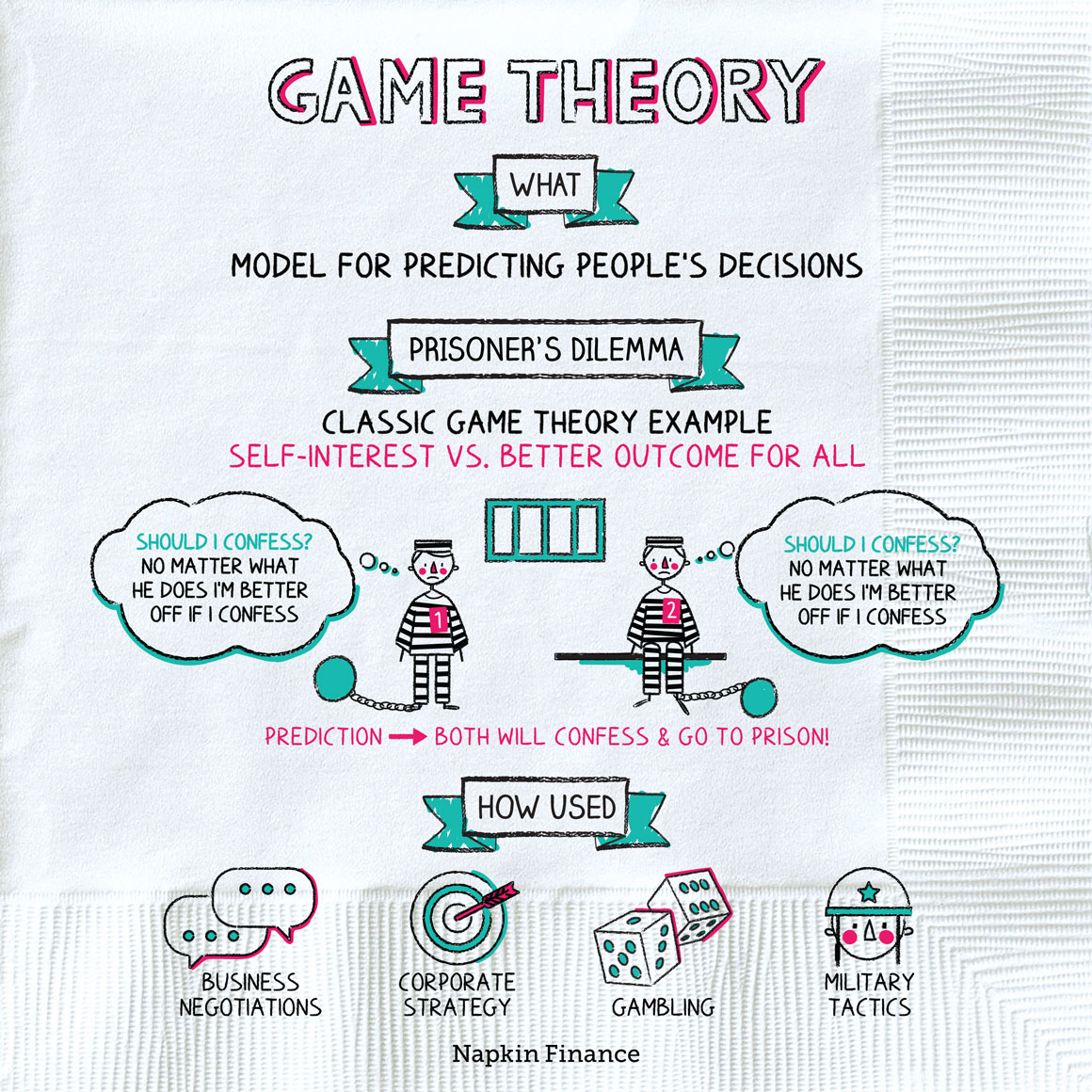Game Theory
Roll the Dice
Game theory is an economic model for predicting people’s decisions in tricky situations.
Game theory lets you analyze a situation and figure out which outcomes are possible or probable and which could result in the best outcome for you (or for the other players). The theory is based on the assumptions that:
- Each person involved will act rationally
- Each person will try to maximize their payoff
Game theory can be a valuable decision-making tool. For example, a business can use it to analyze how competitors or investors might respond if the company introduces a new service, merges with another organization, or changes its prices.
The classic game theory example is called the prisoner’s dilemma. In this hypothetical situation, two accomplices are arrested by the police. How much prison time they’ll get depends on whether they talk or stay silent.
| Prisoner 1 talks (and rats out Prisoner 2) | Prisoner 1 doesn’t talk | |
| Prisoner 2 talks (and rats out Prisoner 1) | Both talk → Both get 5 years |
Prisoner 2 talks → Gets 0 yearsPrisoner 1 doesn’t → Gets 8 years |
| Prisoner 2 doesn’t talk | Prisoner 1 talks → Gets 0 yearsPrisoner 2 doesn’t → Gets 8 years |
Neither talks → Both get 6 months |
Obviously, the best-case scenario is for neither to talk. But the cops are questioning Prisoner 1 and Prisoner 2 in separate rooms, and neither knows what the other will do.
From Prisoner 1’s point of view, whether or not Prisoner 2 talks, Prisoner 1 is better off by talking (and ratting out Prisoner 2). If Prisoner 2 talks (and rats out Prisoner 1), Prisoner 1 cuts his prison time from eight years to five years by also talking. If Prisoner 2 stays quiet, Prisoner 1 can cut his prison time from half a year to zero by talking (and ratting out Prisoner 2).
The same logic goes for Prisoner 2. The model predicts that in the end they’ll both end up ratting each other out. (This is called a Nash equilibrium—named for the economist John Nash, who developed the theory).
In the real world, game theory can be used to model decisions in certain situations, such as:
- Business negotiations
- Corporate strategy
- Gambling
- Military tactics
Game theory can be adapted to a range of situations. Depending on the scenario at hand, some of the rules of the game you can use include:
| Types | How it works |
| Cooperative vs. noncooperative | Cooperative: Players work together to pick a strategy
Noncooperative: Each player makes a decision independently |
| Perfect vs. imperfect information | Perfect information: All players have access to the same information
Imperfect information: One player has information that the others don’t have |
| Zero-sum vs. positive-sum vs. negative-sum | Zero-sum: When one player gains, another loses by an equal amount
Positive-sum: As a group, the players come out ahead at the end of the game (though some individuals may still lose) Negative-sum: As a group, the players are worse off at the end of the game (though some individuals may still come out ahead) |
Game theory is a way to predict how people might behave in certain situations. It can be used to identify possible and probable outcomes as well as which outcome benefits each player the most. You can apply game theory to a variety of situations, from business mergers to gambling.
- When some researchers tested out the prisoner’s dilemma with real prisoners, the prisoners ratted each other out less than half the time—much less than the model predicts. (Granted, the payoff was coffee and cigarettes, not reduced sentences.)
- Game theory has been used to model outcomes in nuclear standoffs, like the Cuban Missile Crisis. (Seems like it’s worked so far, since we’re still here.)
- In the movie A Beautiful Mind, John Nash has his revelation about game theory when he and all his friends want to talk to the same woman at the bar. He realizes if they all go for her then none of them will get her, so they ignore her and talk to her friends instead.
- Game theory is an approach to predicting people’s decisions in strategic situations.
- The theory models behavior by looking at what one party will do given that it can’t predict or control what the other side will do.
- You can apply game theory to different situations by adjusting the rules of the game, such as with cooperative versus noncooperative games and zero-sum versus non-zero-sum games.
- Game theory can be used to model business and military decision-making.




